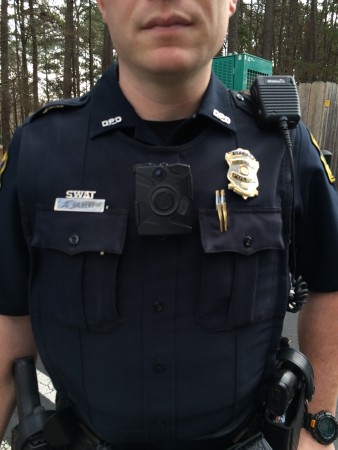
All Dunwoody Police officers now patrol with body cameras mounted on their uniforms, Chief Billy Grogan says.
The national controversy arising from police-involved deaths in Ferguson, Mo., New York City and now Baltimore have left both police officers and their critics calling for more objective evidence of behavior during confrontations between officers and residents. Body-mounted cameras have been promoted as one possible solution.
After a bit more than a month after outfitting all Dunwoody officers with chest-mounted cameras, Grogan said most of them like it.
But officers at first acted warily about the body cameras, Grogan said, just like he saw when training officers to use the then new dashboard cameras as a lieutenant for Marietta Police.
“People were just raising Cain,” Grogan said, “with an ’I don’t want the bosses watching me’ kind of mentality.”
Grogan was a court officer at the time and he said he remembered a woman who was arrested for disorderly conduct and wanted a trial. The prosecutor on cross examination asked the woman if she was as calm the day she was arrested as she was in court. She said yes, Grogan recounted. So the prosecutor brought out the video from a Marietta officer’s dash cam as evidence.
“Of course, she was screaming and cussing all kind of stuff,” Grogan said. He added that case was a good first example of how cameras help protect police officers. Dunwoody Police have already had a few cases where body camera footage exonerated an officer from a citizen complaint, he said.
As soon as the department had body cameras, Dunwoody officers found they could more easily prove their actions against common complaints about officers being “rude, short or ugly” during traffic stops, Grogan said.
But Grogan admitted he has his own questions about them.
“Based on the national conversation, I think that people are expecting more out of the body camera than it’s going to be able to deliver,” Grogan said.
People expecting to see what happened will be disappointed by the two-dimensional view, he said.

Chief Billy Grogan updates residents about the chest-mounted body cameras all officers wear, during a May 3 meeting of the Dunwoody Homeowners Association.
“You will never see what that police officer sees with his eyes being able to look out peripheral vision, [seeing] a person tense up and things you will never be able to pick up on the body camera, but I think it’s better than not having any video at all,” Grogan said.
Most cellphone videos record only the aftermath of a situation, he said, so even a 2D video will help by showing more of the start of an incident.
The policy implemented works to protect both officers and citizens.
“We researched and developed a good policy, which outlines a lot of different things about when to turn [the body camera] on,” Grogan said. “Obviously, we don’t want to record personal conversations around the office or at lunch.”
In terms of the Freedom of Information Act, Grogan said that the legislature passed a law to exempt police officers from the two-party statute that exists in Georgia. The statute states both parties must be made aware and agree to video-taping.
“If we’re going somewhere there’s an expectation of privacy, we say ‘We’re recording; is that okay?’” Grogan said.
The legislature also excludes from open records requests video captured in a private home or place where people have an expectation of privacy, he added.
“It’s only available to the parties involved, the parents of a juvenile involved or attorneys representing the parties involved,” Grogan said. “That’s just for video recorded where there’s an expectation of privacy.”
Other video is subject to open records requests and Grogan admits, “It has been, frankly, a can of worms for some places.”
The challenge lies in the added manpower needed to retrieve and redact portions of video (like juvenile identity information), he said.
The most expensive aspect of a police department using body cameras is the cost associated with storage. Grogan said video of a traffic stop where only a warning was issued will only be kept a few months, but video where a citation was given will be stored about 18 months and video of arrests will be kept for five years.
“It’s not the cameras that cost money; it’s the retention of the video,” Grogan said.
City Council members approved $30,000 in the 2015 budget for 37 body-worn cameras and storage fees, and now Grogan plans to order between six and nine more cameras to use as spares. Some will go to detectives working part-time jobs in uniform as well, Grogan said.

OK. Well is the body cam the enforcer wearing this morning when he pulled me over going to show him forcing me to drive over a barrier in a parking lot causing damage to my car? Or are you all just trying to impress everybody with useless electronics. I can doctor a video all day long and so can you.